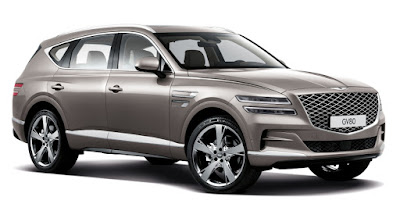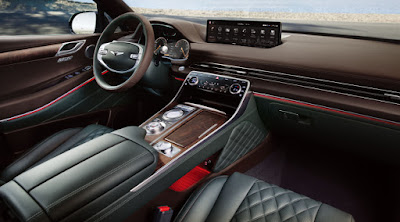2020 Genesis GV80 first view
Genesis – Hyundai’s upmarket offshoot – has become the latest manufacturer to introduce a large luxury SUV. Named GV80, it’s going to be offered with either two or three rows of seats.
Various technologies help to create a comfortable ambience. For example, Road-Noise Active Noise Control generates opposing sound waves to quieten the interior, while an obstacle-detecting camera and continuously-variable damping combine to enhance the ride quality. Also available is a fatigue-reducing ‘active motion’ driver’s seat that incorporates seven air cells.
The dashboard is dominated by a 14.5” split display for the infotainment system. However, there’s no need to touch the on-screen keyboard, because the console-mounted Genesis Integrated Controller boasts a handwriting recognition function.
Unsurprisingly, numerous advanced assistance devices can be specified. Among them is Smart Cruise Control with Machine Learning, which uses artificial intelligence to mimic human behaviour when delivering semi-autonomous driving.
Arguably less innovative are the powertrains, as they don’t yet feature any form of electrification.
At launch in Korea, the only engine option will be a 3.0 litre, six-cylinder diesel that produces 274 bhp (204 kW / 278 PS) plus 588 Nm (433 lb/ft) of torque. Performance potential remains a mystery but, according to Genesis, a rear-wheel drive GV80 is able to achieve an average fuel economy figure of 33.3 mpg (8.5 l/100km).
The line-up is set to be augmented by a two turbocharged petrol units of unknown capacity or output (essential for the key North American markets). In addition, all-wheel drive with Multi-Terrain Control and an electronically-controlled rear limited-slip differential has been developed for any prospective GV80 owners who might want to venture off road.
Although plans to bring Genesis to Europe are still to be confirmed, reports suggest that the brand could be an exhibitor at this year’s Geneva Motor Show.
Related post:
2019 NACTOY winners
Various technologies help to create a comfortable ambience. For example, Road-Noise Active Noise Control generates opposing sound waves to quieten the interior, while an obstacle-detecting camera and continuously-variable damping combine to enhance the ride quality. Also available is a fatigue-reducing ‘active motion’ driver’s seat that incorporates seven air cells.
The dashboard is dominated by a 14.5” split display for the infotainment system. However, there’s no need to touch the on-screen keyboard, because the console-mounted Genesis Integrated Controller boasts a handwriting recognition function.
Unsurprisingly, numerous advanced assistance devices can be specified. Among them is Smart Cruise Control with Machine Learning, which uses artificial intelligence to mimic human behaviour when delivering semi-autonomous driving.
Arguably less innovative are the powertrains, as they don’t yet feature any form of electrification.
At launch in Korea, the only engine option will be a 3.0 litre, six-cylinder diesel that produces 274 bhp (204 kW / 278 PS) plus 588 Nm (433 lb/ft) of torque. Performance potential remains a mystery but, according to Genesis, a rear-wheel drive GV80 is able to achieve an average fuel economy figure of 33.3 mpg (8.5 l/100km).
The line-up is set to be augmented by a two turbocharged petrol units of unknown capacity or output (essential for the key North American markets). In addition, all-wheel drive with Multi-Terrain Control and an electronically-controlled rear limited-slip differential has been developed for any prospective GV80 owners who might want to venture off road.
Although plans to bring Genesis to Europe are still to be confirmed, reports suggest that the brand could be an exhibitor at this year’s Geneva Motor Show.
Related post:
2019 NACTOY winners





+Front+Side.jpg)


%2BFront%2BSide.jpg)



Comments
Post a Comment